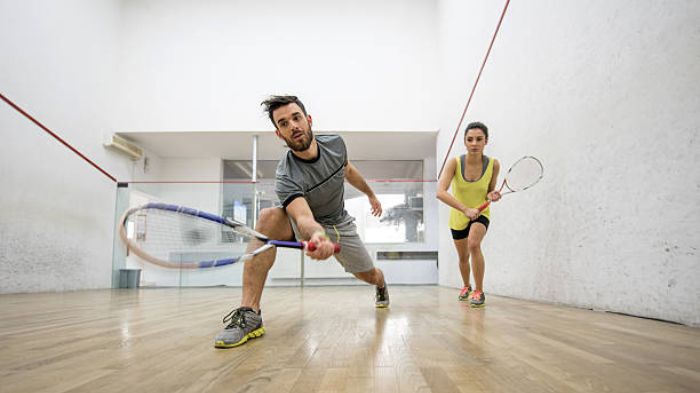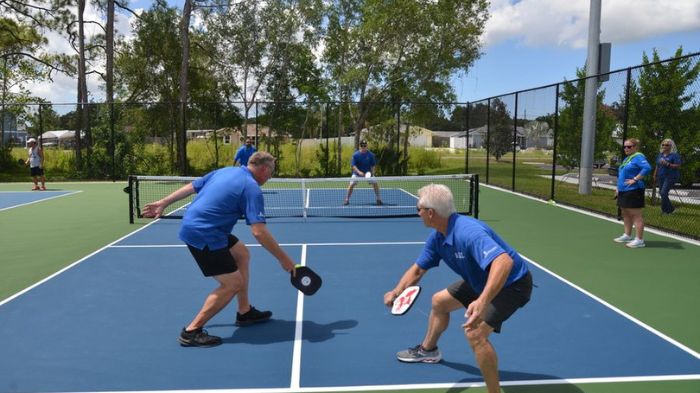There is a tonne of options available when it comes to racquet sports, each with certain qualities and allure of its own. Pickleball and squash are two such popular sports that have significantly grown in popularity in recent years.
Squash, which is well-known for its frantic pace and challenging gameplay, and pickleball, which combines aspects of tennis, badminton, and table tennis, both provide excellent exercise and an exhilarating experience.

In order to better comprehend the fundamental elements of these two sports and how they differ and complement one another, we’ll examine and compare them in this blog. You can also learn about paddle tennis vs pickleball
What is Pickleball?
Let’s begin with pickleball. Originating in the mid-1960s, pickleball is a paddle sport that combines elements of tennis, badminton, and table tennis. It is played on a smaller court with a lower net and uses a solid paddle and a plastic ball with distinctive holes.
Pickleball is known for its easy-to-learn rules, making it accessible to players of all ages and skill levels. The game is played in both singles and doubles formats, adding to its versatility and appeal. Know how to pickleball on clay courts?
What is Squash?
On the other hand, squash is a racquet sport that has been around for centuries. It is played on a four-walled court with a small rubber ball. The objective is to hit the ball against the front wall above the tin while following specific rules.
Squash requires quick reflexes, agility, and strategic shot placement, making it a highly intense and physically demanding sport.
Pickleball Vs. Squash: Key Aspects
Now, let’s delve into the key aspects that differentiate pickleball and squash:
- Number of People That Can Play: Pickleball can be played in both singles and doubles formats, accommodating a wide range of players. Squash, on the other hand, is predominantly played in a singles format, although doubles squash is also an option.
- The Court: Pickleball is typically played on a smaller court, often a modified tennis court. Squash, however, is played in a larger four-walled court with distinct boundaries.
- The Ball: Pickleball uses a plastic ball with holes, similar to a wiffle ball, which reduces its speed and makes it easier to control. Squash, on the other hand, uses a small, high-compression rubber ball that can reach high speeds and requires precise timing and skill to hit.
- The Rackets: Pickleball paddles are larger and solid, resembling oversized table tennis paddles, providing a larger hitting surface and making it easier to strike the ball. Squash rackets are smaller and have a long, narrow frame, allowing for greater maneuverability and control.
- The Net: Pickleball has a lower net than squash, which requires different techniques and strategies when playing close to the net.
- Accessibility to Play: Pickleball’s simplified rules and modified court size make it more accessible to a broader range of players, including beginners and older individuals. Squash, with its faster pace and specific court requirements, may have a steeper learning curve for newcomers.
- Gear Needed: Pickleball requires a paddle and a plastic ball, both of which are relatively affordable and easily accessible. Squash players need a racquet, balls, and proper squash shoes, which may involve slightly higher investment.
- Clothing: In pickleball, players typically wear athletic attire, including comfortable shoes and appropriate clothing. Squash players often wear specific squash shoes that provide better grip and stability on the court.
Pickleball vs. Squash: The Health Benefits
- Cardiovascular Exercise: Both pickleball and squash provide excellent cardiovascular workouts, improving stamina, endurance, and overall fitness levels. The fast-paced nature of squash and the quick movements required in pickleball contribute to enhanced agility, reflexes, and hand-eye coordination.

- Agility and Reflexes: Squash’s high-speed ball movements and the dynamic nature of pickleball demand quick thinking, rapid movements, and precise footwork. Engaging in these sports sharpens reflexes, improves coordination, and enhances reaction times, benefitting you both on and off the court.
- Core Strength and Stability: Pickleball and squash engage the core muscles, promoting strength and stability. In pickleball, the rotational movements involved in striking the ball activate the abdominal and obliques, while squash requires powerful movements like lunges and twists that strengthen the core muscles, providing a solid foundation for movement and balance.
- Hand-Eye Coordination: Both sports require precise timing and accuracy in striking the ball with a paddle or racquet. Playing pickleball or squash improves hand-eye coordination, enhancing your ability to connect visual perception with motor skills. This improvement carries over to other sports and daily activities.
- Mental and Emotional Benefits: Pickleball and squash offer mental benefits through improved focus, concentration, and decision-making abilities. The social aspects of pickleball, often played in a doubles format, foster camaraderie, and teamwork, while squash provides stress relief and boosts self-confidence through friendly competition.
Also, Read About: Playing pickleball after hip replacement
FAQs
Both squash and pickleball can be enjoyed by beginners, but pickleball is often considered more beginner-friendly due to its slower pace and smaller court size. The rules of pickleball are also simpler to grasp, making it easier for newcomers to get started.
Yes, pickleball can be a great alternative for squash players looking for a less physically demanding sport. Pickleball’s slower pace and lower impact on the joints make it a popular choice for those seeking a more relaxed but still engaging racquet sport experience.
Both squash and pickleball offer excellent workouts, but the intensity and physical demands differ. Squash is a high-intensity sport that requires quick movements, explosive power, and endurance, making it a more challenging cardiovascular workout. Pickleball, while still providing a good workout, is generally considered to be less physically demanding and may be more suitable for individuals seeking moderate-intensity exercise.
Both squash and pickleball have vibrant and welcoming communities. Pickleball, with its growing popularity, often attracts a wide range of players of different ages and skill levels, fostering a strong social environment. Squash also has a dedicated community, especially in clubs and leagues, where players can connect and engage in friendly competition.
Conclusion
In the battle of squash versus pickleball, each sport brings its own unique qualities and appeal. While pickleball is known for its accessibility and versatility, squash offers a fast-paced and physically demanding experience.
Ultimately, the choice between the two depends on your personal preferences, skill level, and fitness goals. So whether you prefer the quick reflexes and agility of squash or the social and inclusive nature of pickleball, both sports provide an exciting and fulfilling way to stay active and enjoy the thrill of racquet sports.



